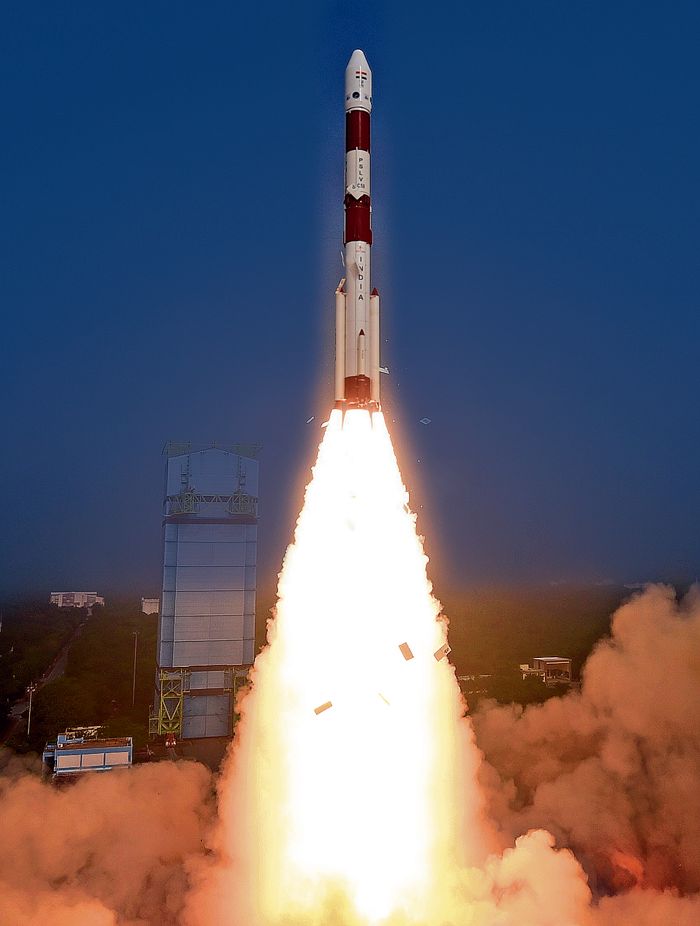ISRO launches satellite to study emission from celestial objects
Date:- 02 Jan 2024

India second nation to set up observatory in space for research
After an impressive 2023, the Indian Space Research Organisation (ISRO) ushered in the New Year on a robust note with the launch of the X-ray Polarimeter Satellite (XPoSat) from its launch pad at Sriharikota in Andhra Pradesh this morning.
With the successful launch of the XPoSat — the first dedicated scientific satellite from the stable of ISRO to carry out research in space-based polarisation measurements of X-ray emission from celestial sources — India has become the second nation to send an observatory to study astronomical phenomena such as black holes, neutron stars, active galactic nuclei, pulsar wind nebulae, etc.
ISRO’s workhorse polar satellite launch vehicle (PSLV), in its 60th mission, lifted off at 9.10 am from the Satish Dhawan Space Centre and 22 minutes later launched the XPoSat into an eastward low inclination orbit.
“On January 1, 2024, yet another successful mission of the PSLV has been accomplished. The PSLV-C58 has placed the primary satellite XPoSat in the desired orbit of 650 km with six-degree inclination,” ISRO Chairman S Somanath said after the launch. Complimenting ISRO, Prime Minister Narendra Modi wrote on X: “A great start to 2024, thanks to our scientists! This launch is wonderful news for the space sector and will enhance India’s prowess in this field. Best wishes to our scientists at @isro and the entire space fraternity in taking India to unprecedented heights”.
“ISRO begins 2024 in Style! Successful launch of PSLV-C58/XPoSat Mission. Proud to be associated with the Department of Space at a time when Team @isro continues to accomplish one success after the other, with the personal intervention & patronage from PM Sh@narendramodi,” Jitendra Singh, Union Minister of State (independent charge) Science & Technology, posted on X.
XPoSat carries two payloads — POLIX (Polarimeter Instrument in X-rays) and XSPECT (X-ray Spectroscopy and Timing). POLIX is developed by Raman Research Institute (RRI), Bengaluru, and XSPECT by Space Astronomy Group of UR Rao Satellite Centre, Bengaluru.
POLIX will observe about 40 bright astronomical sources of different categories during the planned lifetime of XPoSat mission of about five years. This is the first payload in the medium X-ray energy band dedicated for polarimetry measurements. XSPECT is an X-ray SPECtroscopy and Timing payload on board, which can provide fast timing and good spectroscopic resolution in soft X-rays.
The PSLV Orbital Experimental Module-3 (POEM-3, also called PS4), was executed during the mission to meet the objective of launching at a lower orbit 10 other payloads (including seven built by academic institutions and start-ups) carried by the launcher.
After injection of XPoSat at 650 km, PS4 stage was lowered to 350 km by restarting it twice to release the 10 payloads. PS4 will also function as a 3-axis stabilised orbital platform.
All-woman sat among 10 payloads
- PSLV-C58, in its 60th mission, carried XPoSat and deployed it in intended 650 km low earth orbit
- Altitude lowered to 350 km by restarting fourth stage of vehicle for PSLV Orbital Experimental Module-3 (POEM-3) experiment
- Rocket’s fourth stage converted into orbital platform with 10 payloads
- Payload includes Women Engineered Satellite, built by LBS Institute of Tech for Women, Thiruvananthapuram
Courtesy: The Tribune India: 2nd Jan , 2024


